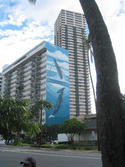A growing sector of the urban populace is turning to “car sharing” — sharing vehicles through membership in nonprofit or for-profit organizations — for cost and convenience. Since 2006, membership in car sharing organizations has grown from about 100,000 to more than 500,000 people. read more »
Transportation
Zipcars: The Car Sharing Market Gets Zapped
Let's Face It, High Speed Rail Is Dead
Advocates were ecstatic when President Obama had $8 billion for high speed rail put into the stimulus bill. His administration planned to make HSR one of the cornerstones of its infrastructure investment program. Secretary of Transportation Ray LaHood visited Europe to check out HSR there in person and came back proclaiming, “High speed rail is coming to America.” The $8 billion, we were told, was a down payment, and that in little more than two decades, America's largest cities would be linked by a web of high speed trains. read more »
Honolulu: Mega Rail Project in a Micro City
An exorbitantly costly rapid transit heavy rail project has been proposed for the small Hawaiian island of Oahu, where the leading metropolis, Honolulu, ranks 53rd in population among U.S. cities, with less than 500,000 people. If the project moves forward it will be the world's only elevated heavy rail in a metro area with a population of under four million. read more »
Orlando’s Sunrail: Blank Checks Induced by Washington
We are supposedly living in an age of austerity, but many federal programs are leading many states into overspending and potential fiscal insolvency. Transit spending is a case in point, as is indicated by the proposed Orlando Sunrail commuter rail project. read more »
Inside Sydney's Central Business District: the Retail Core
World famous for its beautiful harbour setting, Sydney’s Central Business District is undergoing a resurgence. As the hub of Australia’s finance sector, it stumbled during the global crisis. Office vacancies jumped from 5.7 per cent in early 2008 to 8.8 per cent in mid 2009, despite stable supply. Ultimately, though, Sydney was spared the worst, owing to its rise as a staging post for trade and investment in the Asia-Pacific region, which averted the havoc of Europe and North America. Recovery is now underway, if slowly. read more »
Transit: The 4 Percent Solution
A new Brookings Institution report provides an unprecedented glimpse into the lack of potential for transit to make a more meaningful contribution to mobility in the nation's metropolitan areas. The report, entitled Missed Opportunity: Transit and Jobs in Metropolitan America, provides estimates of the percentage of jobs that can be accessed by transit in 45, 60 or 90 minutes, one-way, by residents of the 100 largest US metropolitan areas. read more »
Natural Gas Vehicles Floor It in Long Beach
The Alternate Clean Transportation Expo held in Long Beach earlier this month was a spectacular display of engineering ingenuity by Natural Gas Vehicle providers. The event's theme was that America’s self sufficiency in natural gas has decoupled our energy resources from petroleum prices. But the consensus among the gathered engineers and scientists was to look beyond the current prices of petroleum alone, and consider that domestic self sufficiency includes keeping jobs at home. read more »
Skepticism Greets US DOT's Draft Transportation Bill
An undated--- and possibly still unvetted by OMB---draft of US DOT’s legislative proposal for surface transportation reauthorization, the "Transportation Opportunities Act," has been making the rounds in Washington for the past week. Its publication, however, has been largely ignored by the inside-the-Beltway transportation community. What would ordinarily be an eagerly awaited event and an occasion to compliment the Department , has passed virtually unnoticed. read more »
- Login to post comments
The Public Transport Revolution – Why does it never Arrive?
Since the oil spike in the early seventies, enthusiasts for public transport have predicted that high prices for petrol would trigger a public transport revolution as people finally broke their “addiction” to the motor car and changed their travel mode to buses and trains.
Since then, price bubbles have increased public transport use, and lowered car miles traveled. But these changes have proved to be short-lived. More drive more. read more »
How China’s Megacities Have Avoided Problems of Other Developing Cities
Urbanist media can’t seem to get enough of the megacity these days. Much of the commentary surrounding this topic is disconcertingly celebratory about these leviathans despite such phenomena as overcrowding, high levels of congestion and sprawling slums. read more »




















